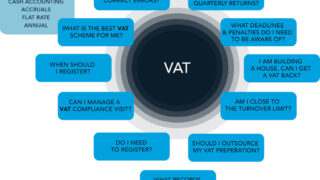When starting a business, the initial tax declaration is one of the most important steps for ensuring compliance with legal regulations and smooth operations. Whether it is a small or large business, properly following the tax declaration process helps avoid legal risks and creates a solid foundation for growth. In this article, we will provide detailed guidance on the initial tax declaration, first-time tax registration, and how to effectively prepare the initial tax declaration documents.
What is Initial Tax Registration?
Definition of Initial Tax Registration
Initial tax registration is the process that a business follows to register necessary information with the tax authorities after receiving its business license. This is the first step in setting up the business’s tax profile, including registering for a tax identification number (TIN), applicable tax types, and other relevant information related to business operations. This process not only ensures compliance with the law but also plays a vital role in securing legal benefits, such as enjoying tax incentives or avoiding unnecessary future disputes.
Benefits of Timely Initial Tax Registration
Timely tax registration helps businesses establish credibility and build a positive relationship with the tax authorities. Businesses that register on time often have the opportunity to receive government support, such as tax exemptions or financial assistance policies. Furthermore, early and complete registration helps businesses manage their tax obligations more effectively, avoiding penalties for errors or missed submissions. This also serves as a foundation for the business to be recognized as legitimate in financial transactions.
Consequences of Not Registering for Tax on Time
Failing to register for taxes on time or submitting late registration can lead to serious consequences. First, businesses will face administrative fines and may even have their operations suspended in severe cases. Additionally, the lack of initial registration information can make it difficult for the business to engage in financial transactions or participate in bidding processes. Moreover, this can negatively affect the company’s reputation and its ability to collaborate with partners.
Who Needs to Complete Initial Tax Registration?
All businesses, from sole proprietorships, limited liability companies (LLCs), joint-stock companies, to foreign entities operating in Vietnam, are required to complete initial tax registration. Additionally, individual business owners or specialized economic organizations must also fulfill this obligation if they have a business registration. This regulation ensures that all types of businesses operating in Vietnam are properly managed and held to equal standards in fulfilling their tax obligations.
What Documents Are Required for Initial Tax Registration?
Basic Components of the Tax Registration File
The initial tax registration file generally includes the business registration license, the representative’s ID card or citizenship card, and the required tax declaration forms. Depending on the type of business, additional documents such as the lease agreement for the business premises or the appointment decision for the chief accountant may also be necessary. Proper preparation of all required documents is an essential step to avoid rejection when submitting the file to the tax authorities.
Legal Document Requirements
The legal documents included in the initial tax registration file must be notarized or authenticated according to legal regulations. This ensures the accuracy and legal validity of the information provided. Businesses should carefully check the documents before submission to avoid having to make amendments or additions, which may delay the registration process. Complying with this requirement not only demonstrates the business’s responsibility but also minimizes the risk of future legal disputes.
Steps for Preparing a Complete File
Deadline for Submitting Initial Tax Registration Documents
The deadline for submitting initial tax registration documents is typically within 10 working days from the date the business receives its business license. Failing to meet this deadline will result in penalties as stipulated by the law. To avoid risks, businesses should plan clearly and submit the documents as soon as possible after receiving the business license.
What is the Process for Initial Tax Registration?
Detailed Steps in the Registration Process
The initial tax registration process consists of 4 main steps:
- Prepare the documents: Collect all required paperwork and forms as per the regulations.
- Submit the documents: Submit them to the tax authority or through the online portal.
- Verify the documents: The tax authority will verify the validity of the documents.
- Receive the tax identification number (TIN): After approval, the business will be issued a tax ID number.
How to Choose the Right Tax Authority
Businesses are required to file tax declarations at the tax authority where their headquarters or branch is located. For businesses operating in multiple locations, it is necessary to contact the relevant tax authority for specific guidance. Selecting the appropriate tax authority ensures a smooth and compliant process.
Guidelines for Submitting Documents via the Electronic System
To submit documents online, businesses need to access the General Department of Taxation’s e-portal, create an account, and follow the instructions. The system will guide businesses through each step, from downloading forms, filling out information, to submitting the documents and receiving confirmation. This method saves time and reduces errors compared to direct submission.
Important Notes When Registering for Taxes
Businesses need to fill out all information in the forms accurately to avoid the need for revisions or additional submissions. Additionally, it is essential to stay updated on new tax regulations to ensure ongoing compliance with the law.
Common Mistakes in Initial Tax Registration
Errors in the Documentation
Common mistakes include missing required documents, incorrect information filled out on forms, or using documents that are not notarized. These errors often lead to the rejection of the file, causing delays in completing the registration. To avoid mistakes, businesses should carefully review their documents before submission and seek assistance from professional accounting services if needed.
Missing the Registration Deadline
Failing to register within the deadline will result in financial penalties. In particular, if the violation is prolonged, the business may be blacklisted by the tax authorities. Therefore, tracking and adhering to deadlines is a mandatory requirement for every business.
Failure to Update New Legal Regulations
Tax laws are constantly changing, and failing to stay updated can lead to inadvertent violations. This can result in financial losses and harm the business’s reputation. Businesses should have a dedicated team or use professional services to ensure they stay informed about the latest regulations.
How to Resolve Errors in Tax Registration
When mistakes are detected, businesses should immediately contact the tax authorities or accounting services for guidance on how to resolve the issue. Depending on the severity, businesses may need to submit supplementary documents or correct the file without incurring penalties.
Initial tax registration is a crucial first step for businesses to operate legally and stably. With the detailed steps above, you can confidently handle the registration yourself or seek professional accounting services to ensure full compliance. Don’t let small mistakes disrupt your business plans. If you need further assistance, feel free to contact us for detailed advice!
Learn more: Tax Accounting – Essential Knowledge and Common Mistakes to Avoid
For any inquiries, contact Wacontre Accounting Services via Hotline: (028) 3820 1213 or email info@wacontre.com for prompt assistance. With a team of experienced professionals, Wacontre is committed to providing dedicated and efficient service. (For Japanese clients, please contact Hotline: (050) 5534 5505).






